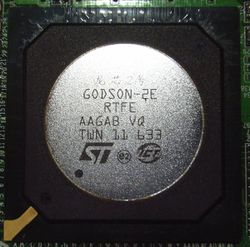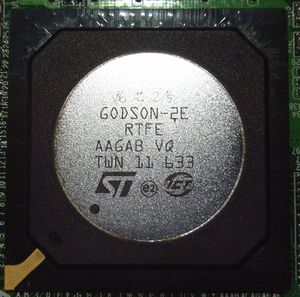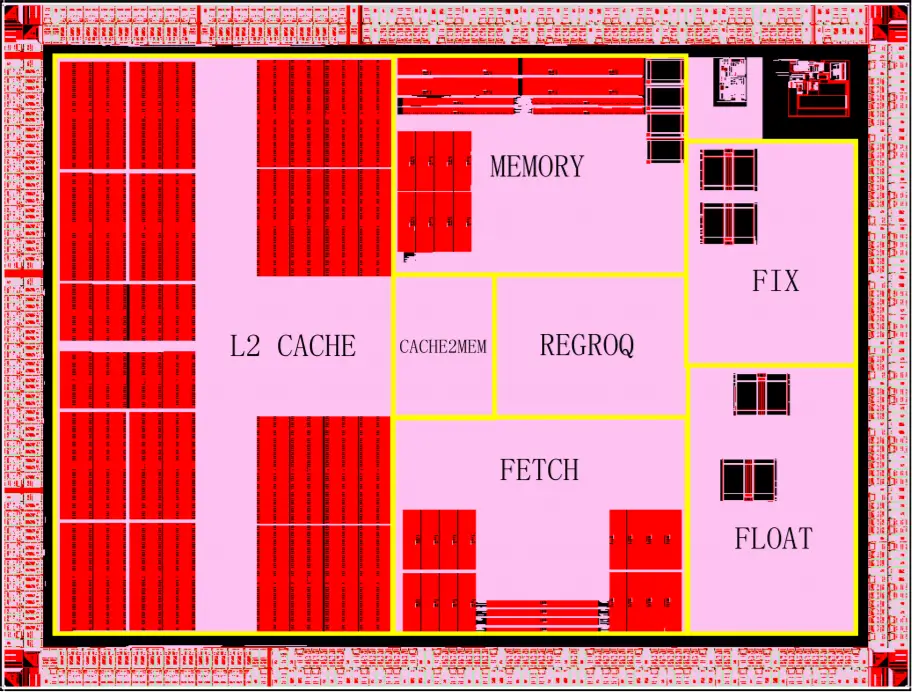From WikiChip
Godson-2E - Loongson
| Edit Values | |
| Godson-2E | |
 | |
| Godson-2E chip | |
| General Info | |
| Designer | Loongson |
| Manufacturer | STMicroelectronics |
| Model Number | 2E |
| Part Number | CZ70 |
| Market | Desktop |
| Introduction | 2006 (announced) March 18, 2006 (launched) |
| General Specs | |
| Family | Godson 2 |
| Series | Godson 2 |
| Frequency | 1,000 MHz |
| Bus type | SysAD |
| Microarchitecture | |
| ISA | MIPS64 (MIPS) |
| Microarchitecture | GS464 |
| Core Name | GS464 |
| Process | 90 nm |
| Transistors | 47,000,000 |
| Technology | CMOS |
| Die | 36 mm² |
| Word Size | 64 bit |
| Cores | 1 |
| Threads | 1 |
| Multiprocessing | |
| Max SMP | 1-Way (Uniprocessor) |
| Electrical | |
| Power dissipation | 7 W |
| Vcore | 1.2 V |
Godson-2E (龙芯2E) is a 64-bit MIPS performance processor developed by ICT and later Loongson for desktop computers. Introduced in early 2006, the Godson-2E operates at up to 1 GHz consuming 7W. This chip was manufactured on STMicroelectronics' 90 nm process and provides roughly three times the performance of 2C. This processor is known as China's first processor to reach gigahertz frequency.
The Godson-2E introduces a number of improvements over its predecessor, including double the clock frequency, the addition of a large L2 cache, and the integration of the northbridge on-die, supporting up to DDR-333.
Cache[edit]
- Main article: GS464 § Cache
|
Cache Organization
Cache is a hardware component containing a relatively small and extremely fast memory designed to speed up the performance of a CPU by preparing ahead of time the data it needs to read from a relatively slower medium such as main memory. The organization and amount of cache can have a large impact on the performance, power consumption, die size, and consequently cost of the IC. Cache is specified by its size, number of sets, associativity, block size, sub-block size, and fetch and write-back policies. Note: All units are in kibibytes and mebibytes. |
|||||||||||||||||||||||||
|
|||||||||||||||||||||||||
Memory controller[edit]
|
Integrated Memory Controller
|
||||||||||||||
|
||||||||||||||
Graphics[edit]
This chip had no integrated graphics processing unit.
Die Shot[edit]
- 90 nm process
- 47,000,000 transistors
- 36 mm²
References[edit]
- Hu, Wei-Wu, and Jian Wang. "Making effective decisions in computer architects’ real-world: Lessons and experiences with Godson-2 processor designs." Journal of Computer Science and Technology 23.4 (2008): 620-632.
Facts about "Godson-2E - Loongson"
| base frequency | 1,000 MHz (1 GHz, 1,000,000 kHz) + |
| bus type | SysAD + |
| core count | 1 + |
| core name | GS464 + |
| core voltage | 1.2 V (12 dV, 120 cV, 1,200 mV) + |
| designer | Loongson + |
| die area | 36 mm² (0.0558 in², 0.36 cm², 36,000,000 µm²) + |
| family | Godson 2 + |
| first announced | 2006 + |
| first launched | March 18, 2006 + |
| full page name | loongson/godson 2/2e + |
| has ecc memory support | true + |
| instance of | microprocessor + |
| isa | MIPS64 + |
| isa family | MIPS + |
| l1$ size | 128 KiB (131,072 B, 0.125 MiB) + |
| l1d$ description | 4-way set associative + |
| l1d$ size | 64 KiB (65,536 B, 0.0625 MiB) + |
| l1i$ description | 4-way set associative + |
| l1i$ size | 64 KiB (65,536 B, 0.0625 MiB) + |
| l2$ description | 4-way set associative + |
| l2$ size | 0.5 MiB (512 KiB, 524,288 B, 4.882812e-4 GiB) + |
| ldate | March 18, 2006 + |
| main image |  + + |
| main image caption | Godson-2E chip + |
| manufacturer | STMicroelectronics + |
| market segment | Desktop + |
| max cpu count | 1 + |
| max memory bandwidth | 4.967 GiB/s (5,086.208 MiB/s, 5.333 GB/s, 5,333.276 MB/s, 0.00485 TiB/s, 0.00533 TB/s) + |
| max memory channels | 1 + |
| microarchitecture | GS464 + |
| model number | 2E + |
| name | Godson-2E + |
| part number | CZ70 + |
| power dissipation | 7 W (7,000 mW, 0.00939 hp, 0.007 kW) + |
| process | 90 nm (0.09 μm, 9.0e-5 mm) + |
| series | Godson 2 + |
| smp max ways | 1 + |
| supported memory type | DDR-333 + |
| technology | CMOS + |
| thread count | 1 + |
| transistor count | 47,000,000 + |
| word size | 64 bit (8 octets, 16 nibbles) + |
